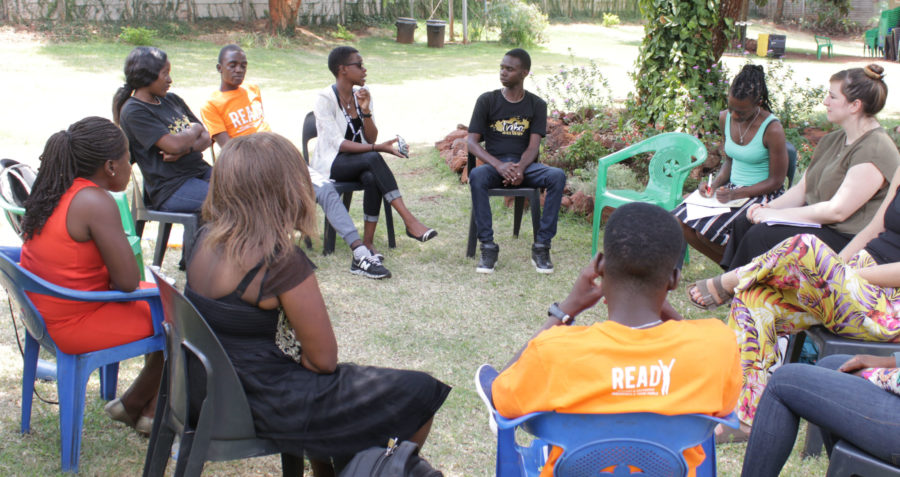Theresa’s story: From stigma to peer supporter and beyond
 © Frontline AIDS/Africaid 2019
© Frontline AIDS/Africaid 2019
For the past six years, Theresa has been volunteering her time and sharing her experiences of living with HIV with other young Zimbabweans who are newly diagnosed.
Talking about how she first felt on learning her HIV status while still very young, she says: “Growing up, I used to be someone who was lonely most of the time because I couldn’t have friends. At school I used to face stigma and I used to have self-stigma. I didn’t want to mingle with others.
“I also defaulted from medication for over a year and a half as I was going through a lot of things. So that’s when I joined Africaid Zvandiri’s support group and was introduced to one of the CATS.”
Peer support is vital
Community adolescent treatment supporters, or CATS, play a vital role providing information and counselling to other young people living with HIV through home visits and at clinics. They encourage young people struggling with side-effects, ‘treatment fatigue’ or a lack of support to stick to their HIV treatment.
“Meeting my other peers who were HIV positive really motivated me,” Theresa recalls, because all along I thought I was the only child who was living with HIV. Now I had another family. I was feeling happy and had managed to gain confidence. I was starting to know more about HIV and understand it.”
When she finished her academic studies in 2013, Theresa decided to become a CATS herself. “I just need to give hope to the hopeless because, looking at my life, it really changed me.”
The challenges behind adhering to treatment
After six years as a peer supporter, Theresa has come across many reasons for young people defaulting on medication. Even if they know their status, being able to keep up taking medication at the same time every single day can be hard.
“Some [young people] know that they have to take this medication for their virus to be suppressed,” she says. “They’ve been told that it’s for the rest of their life but, for now, they are fit and strong and no longer sick so they get tired of taking it.
“There is a shortage of drugs so at some clinics it’s difficult to get second-line medication[1],” she explains. “You might go to a clinic appointment and hear that there is no medication. This will lead me to default because I don’t have the money to go and buy the second-line medication in the pharmacy.”
She goes on to say: “There is also an issue of faith healing that is really affecting young people. Some people will say that if a pastor says that you are healed, there is no need for you to take your medication. They say you have to believe in God. It was really killing lots of young people.”
Disclosure is another issue that sometimes plays a part in not adhering to treatment. Theresa cites an example where a young person may not have been told their HIV status and think that they are actually taking headache tablets, but then they do not understand why they need to continue taking them daily. Or they may not have disclosed their status to their partner and then be unable to take their medication while with them for fear of being discovered.
Pursuing your dream
Theresa is rightly very proud of the part that she has played in making a difference to others.
“One of my beneficiaries had suicidal thoughts when she was told that she was HIV positive. I met with her and started giving her some counselling sessions and sharing my life experience,” she says. “I then told her about Africaid Zvandiri and she volunteered as a CATS. She says that I really changed her life. I feel like I have helped to make other people successful also.”
Her own early dreams of joining the army or becoming an air hostess were thwarted because her HIV status meant that she was excluded from being able to apply for scholarships. However, she now intends to put the last six years to even more good use by forging a career for herself as a primary health counsellor. She also has entrepreneurial ambitions: “By doing a skill like hairdressing, I would like to have my own salon and employ others.”
Theresa is adamant about the need for policy change in Zimbabwe for other young people living with HIV who aspire to work in specific sectors. “As young people we want to be able to fulfil our dreams,” she insists.
About our programme
Theresa was a programme participant and then a community adolescent treatment supporter with READY+ which is part of a portfolio of programmes designed to build Resilient and Empowered Adolescents and Young people (READY). The four-year programme aims to reach 30,000 adolescents and young people living with HIV in Mozambique, eSwatini, Tanzania and Zimbabwe. Its focus is on increasing access to holistic care and support: promoting not only sexual and reproductive health and rights but also mental health in order to foster resilience.
[1] Second-line regimens usually have a greater pill burden, are more expensive and more demanding in terms of adherence compared with first-line regimens. Second-line medications have to be taken where first-line medication has failed; this can be for a number of reasons, including challenges with adherence.
Further Reading
Tags
Community Adolescent Treatment Supporters (CATS)Living with HIVPeer supportREADYStigma and discriminationYoung peopleZimbabwe





